-
By Meghan NevilleNov 3, 2022, 2:41 pm1.1k ptsInteresting Special Content
Special ContentСlients often come to consulting companies wondering whether their current code can support new requirements, regional expansion, growing business, and so on. Other clients seek out code reviews to uphold consistent maintenance, see potential vulnerabilities, and deal with bugs and other problems in the code.
Unfortunately, many product owners have learned tough lessons after waiting too long to get their code reviewed and faced unsurmountable issues rendering their code unscalable, buggy, unsafe or unpleasant for users, or even obsolete. Many times, if they had performed a code audit earlier, their product development process would've gone more smoothly, quickly, and cost-effectively.
What is a Software Code Audit?
A software code audit is a thorough code review that analyzes a project's architecture, main technologies, and tools. A good code audit gives you the opportunity to see whether a project will work well for your business.
A Code Audit Helps You to:
- See which tools are out-of-date.
- Determine and assess security risks.
- Discover poor development practices.
- Avoid bigger problems in the future.
- Upgrade the quality, maturity, and maintainability of a product.
When do You Need a Code Audit?
Do you know whether your code needs an audit? And when is the right time to perform one? We recommend a code audit if:
- Your product has performance issues
- Your product is old and is likely outdated or obsolete
- You don't understand what is poorly affecting your product's work
- You haven't conducted a code audit for over 6 months
What Should a Code Audit Include?
A code audit is important for any product development; it guarantees that your code is clear and the project is ready to be delivered securely with lasting quality. While it may vary a bit between service providers, a good code audit should include the following:
- An examination of your current technology stack and project architecture.
- An analysis of security vulnerabilities.
- A code quality check.
- A performance and scalability check.
- Detection of potential maintenance issues.
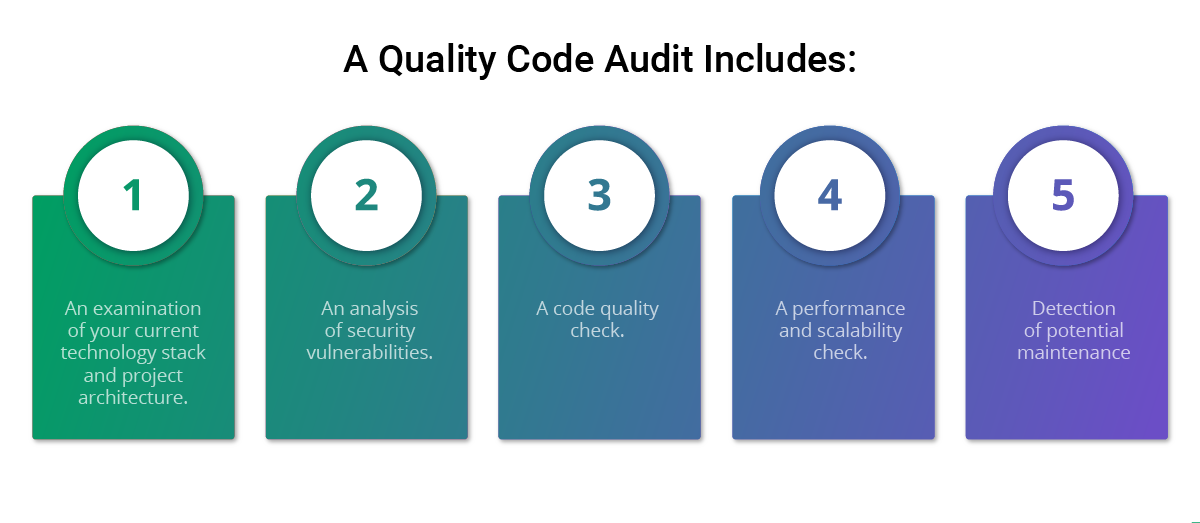
Types of Software Code Review
Software code reviews vary and are characterized by their overarching goals. At times, it may not be necessary to have a code audit check the whole product. Instead, separate parts can be reviewed as the product requires.
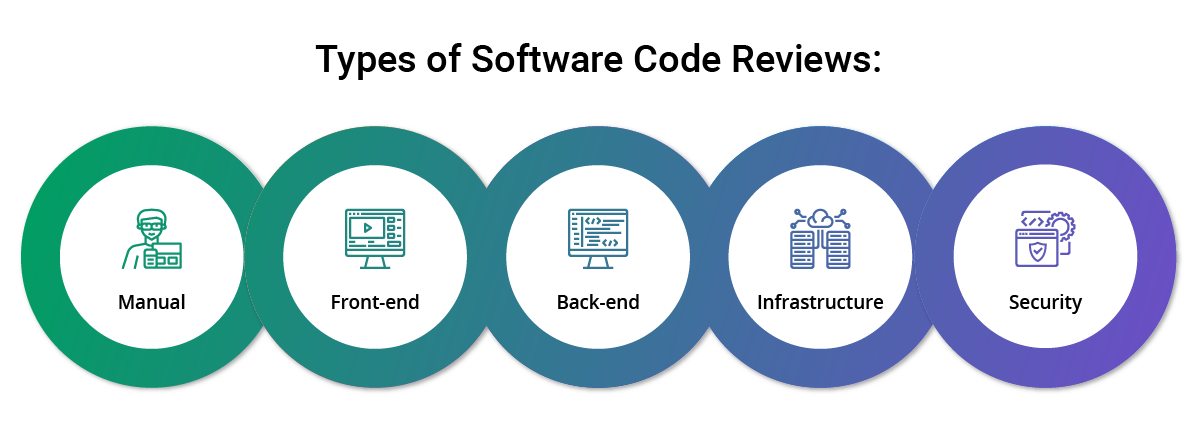
Manual Code Audit
A manual code audit provides an understanding of whether the code adheres to common coding standards. For MVPs, a manual review allows you to check whether your chosen technologies and tools are suitable for further growth and scalability.
We recommend this type of audit to those with MVPs and full-featured products that are ready to launch and look for investors. A manual audit will give startups and new businesses the confidence in their code to be more persuasive, especially when pitching their product to investors.
For mature projects, a manual code audit can detect outdated tools, technologies, or approaches that are currently slowing down product performance.
Front-End Code Audit
Front-end code reviews help you detect the issues within the code that are responsible for how your user interface is experienced. During this audit, there is special attention paid to the general performance and responsive design of your front-end.
Similarly, you can request a website performance audit that will help speed up the desktop and mobile versions of your website. A speedy and responsive website is crucial for search engine ranking and keeping users on your site.
Back-end Code Audit
If you are needing to check your general code complexity, and whether it's capable of handling any potential security risks, then you will want a back-end code audit. In this type of review, experts will look at issues such as outdated tools, technologies, and code structures. With a back-end audit, you will know exactly which aspects to fix for you to enhance your product reliability.
Infrastructure Code Audit
An infrastructure audit gives you the opportunity to see how your servers perform and whether your systems are running efficiently. Additionally, auditing service providers often will check to see that the setup is designed securely and that servers are running up-to-date, so you can avoid security risks. Best of all, an infrastructure code audit improves your site's speed, optimizes the servers, and helps to secure space in the cloud, which enables you to potentially reduce storage expenses.
Security Code Audit
Worried about security breaches that can lead to data leakage? A security code review helps to discover whether there are any security flaws or database permissions missing. This type of inspection allows you to find vulnerabilities in the code, avoid additional costs for fixing bugs, and develop a code audit checklist of potential issues to be aware of for the future of your product.
Top Reasons to Perform a Code Audit
Beyond meeting routine checks and tackling performance issues, a good code audit can bring excellent insights into creating or updating a product. We recommend a code audit for your project for four main reasons.
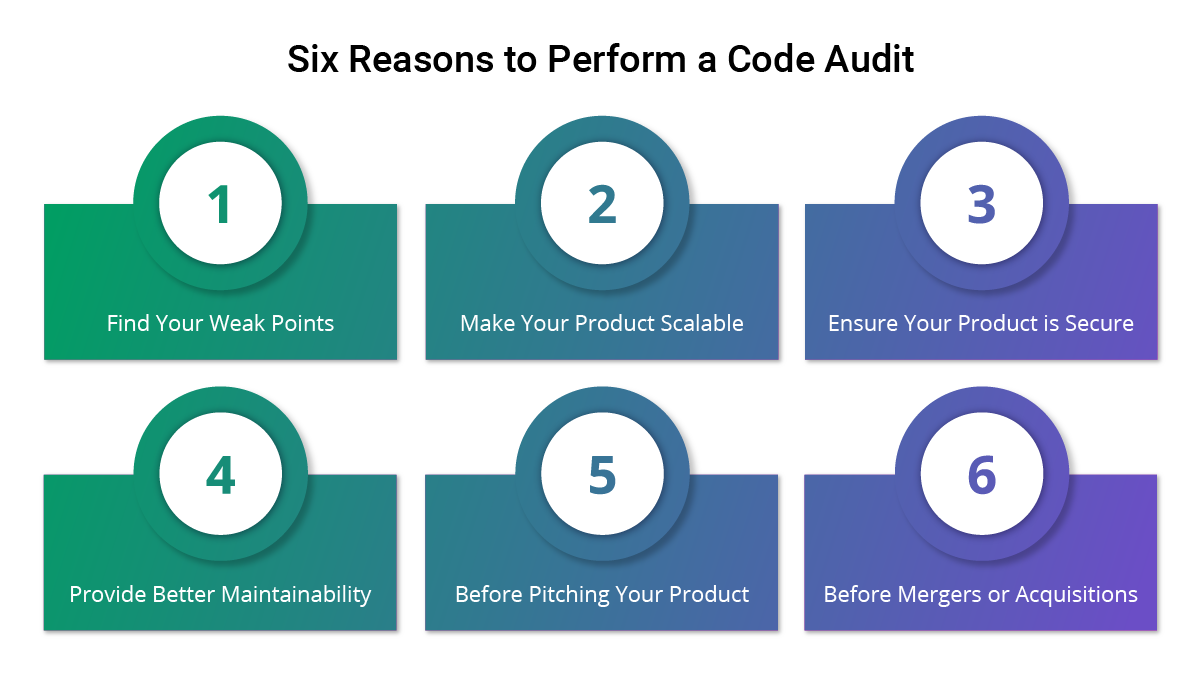
- Find Your Weak Points
Whether your project is one year old or ten years old, it is always possible to areas to improve. Auditing a codebase allows you to discover existing and potential bugs and weak spots, find which technologies are outdated and no longer supported, and get recommendations to better your technology stack.
- Make Your Product Scalable
If you have plans to scale your product in the future, we recommend you double-check that there are no potential problems on the way. A code audit can help you determine if your software system can scale up successfully, handle greater workloads and updates, and have the capability to expand further in the future.
- Ensure Your Product is Secure
By now, we all are aware of the importance of data security. Still, not all products are able to secure data from unauthorized access and data corruption.
It's clear that data security comes first, and this means products must be reviewed regularly to check whether their codebase is strong and secure. A weak codebase can affect the security of your product and even lead to security breaches, vulnerabilities, leaks of personal data, and even fraud. When you continuously audit your code, you are able to determine and fix all security issues to guarantee the security of your product, and protect your team and users.
- Provide Better Maintainability
We'll be honest with you, in the long term, low-quality code is difficult to maintain and will cost you time and money. The same goes for obsolete tools, poorly-used technology, and other structural code issues that make it difficult to update and grow your product for the future.
To avoid these pitfalls, you can ensure your codebase will be easier to maintain if it meets modern software development standards and best practices through the help of code audits.
The Benefits of a Code Audit:
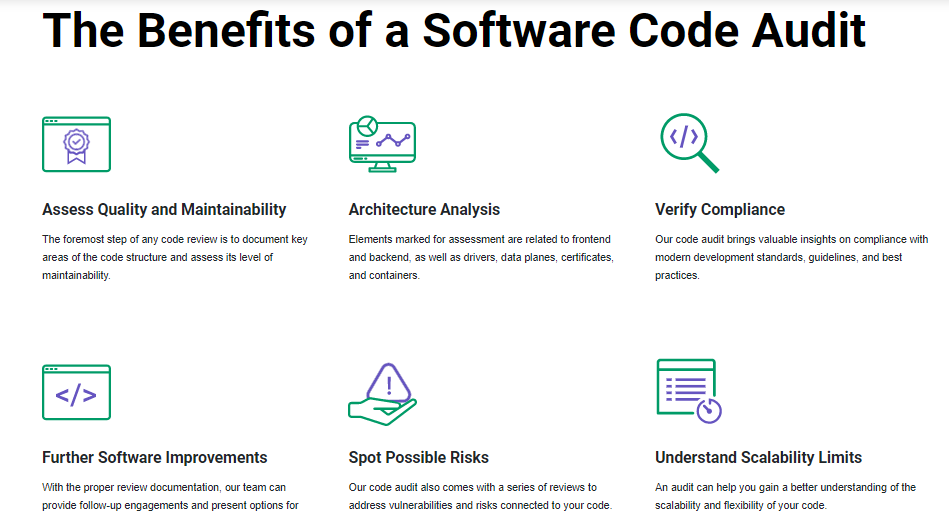
The Five Phases of a Code Audit
Softjourn's software code audits have several distinct phases that are the basis of each review. Each phase is outlined below so you can imagine how your product would be audited.
Phase 1: Analyze the Present Project Structure and Functionality
Our experts objectively analyze the ease of with which your code can be enhanced, to help you to make the right choice about how to best move forward.
Phase 2: Discover Existing and Potential Bugs
Buggy code is harder to correct as you add features that interact with each other and additional potential sources of trouble arise. We will help you to take stock of your current test coverage and figure out how to improve it.
Phase 3: Determine Security Breaches and Vulnerabilities
Hacking incidents are on the rise and tolerance for them is decreasing rapidly. You have the potential to defend your users by following best practices or to disappoint them by falling short. We will identify any security red flags that you need to be aware of.
Phase 4: Validate the Current Performance and Scalability
Hidden inefficiencies can negatively affect your system and impact scaling efforts at the worst possible moment. Our code audit will reveal problems and give you the time to make a relaxed and deliberate judgment of how and when to address them.
Phase 5: Assess the Code Maintainability Level and Associated Risks
Your code and the third-party components which it relies upon continue to evolve. Was your code written with an eye towards transformation or for a quick fix? If the latter, we can identify what refactoring would make it more robust.
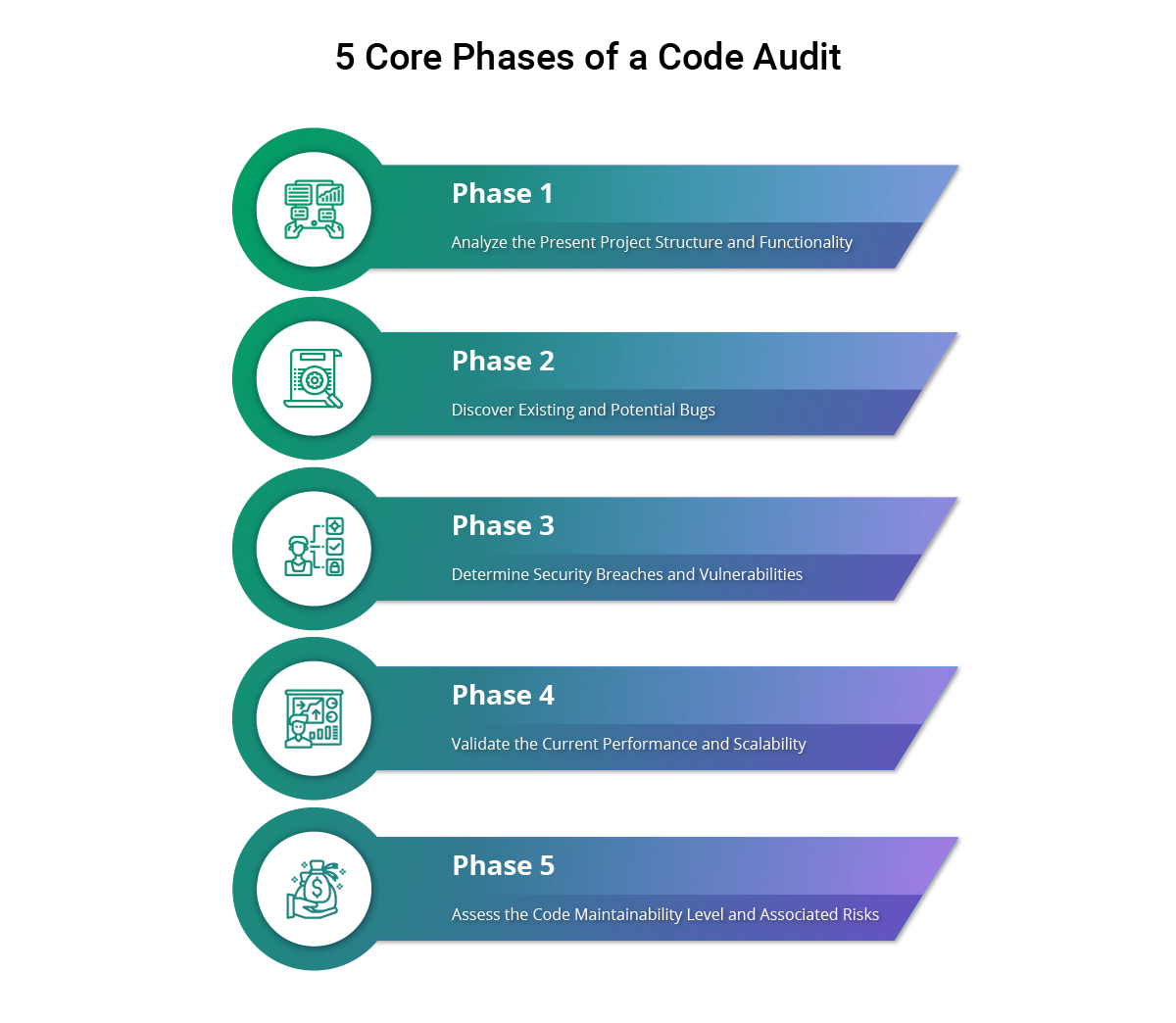
Code Audit Process & Deliverables
What happens when you trust in us to perform a code audit for your product? We conduct a comprehensive and in-depth code analysis of your source code and third-party components.
Our code audit will proceed in a holistic way, not just analyzing discrete code segments but extracting and evaluating the underlying architecture, with a focus on the forms of evolution that you foresee in the feature set and usage of your software system.
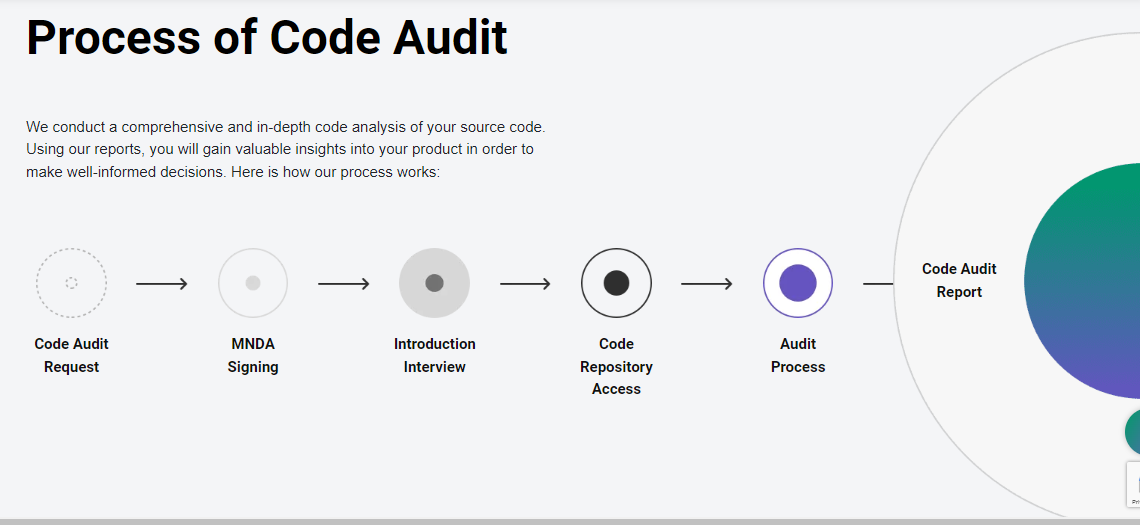
After we conduct a code audit, we present clients with a detailed report and potential code issues for their project. The report includes both critical and non-critical issues as well as recommendations on managing issues based on the client's priorities. When necessary, we can involve a project manager in the software auditing process so you can receive detailed explanations of individual issues. Using our reports, you will gain valuable insights into your product in order to make well-informed decisions.
Depending on the project requirements, the report can include:
- Software code analysis
- Third-party integrations audit
- Architecture analysis
- Security audit
- Automation tests audit and pentest review
- Design review
Using our reports, you will gain valuable insights into your product in order to make well-informed decisions. We will also provide you with estimates of the cost for us to help you to implement any needed improvements to your code.
Our Experience:
Softjourn's experts have been developing, testing, and auditing software products for nearly 20 years. We often utilize software code auditing as part of our product development process to guarantee that our clients' projects will be functional, scalable, and secure.
We know that our innovative clients are always contemplating enhancing their products and services. We want to help you put your ideas into action, and make sure that you are building or expanding on a solid foundation, and not compounding previous errors. We provide a comprehensive report, detailed recommendations, and code issues & error fixing.
Whether you eventually upgrade your code base or rebuild from scratch, we'll give you the confidence to move forward decisively with an understanding of your code's strengths and weaknesses as well as a clear vision of what you will achieve.
About the Author:
Meghan Neville
Meghan Neville is the Content Marketing Coordinator at Softjourn. She uses a combination of market research and creativity to plan, produce, and promote high-quality content that appeals to fintech and ticketing professionals.
Trending Today on Tech News Tube
Follow all of the top tech sites in one place, on the web or your mobile device.















